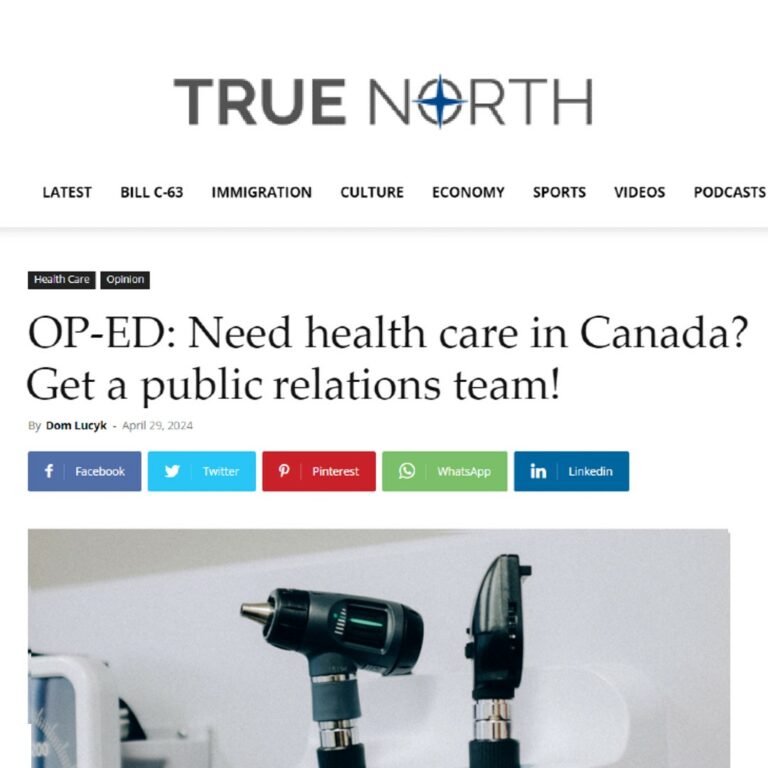TRUE NORTH COLUMN: Need health care in Canada? Get a public relations team!

What’s the first thing that pops into your head when you think of the Canadian health care system?
If you’ve been paying attention, it’s probably tens of thousands of waitlist deaths, sky-high average wait times and millions of patients without a family doctor.
But if you haven’t checked the news since the 1970s or so, you might still have the idea that Canada’s health care is all about equitable access: no matter who you are, you can and will get the care you need.
That’s the point of a universal system, right?
Unfortunately, this vision of Canadian health care simply doesn’t line up with reality. With the government’s bans on private care, most Canadians simply don’t have much of a choice. It’s either wait for the government to get around to fixing your chronic health problem, or travel somewhere else.
However, there is another way to finally get that knee replacement you’ve been waiting years for: tell your story to the media.
Governments don’t want to look bad. Sure, all the stats about the failures of the health care system aren’t great for government popularity, but it’s another thing to put a face to the numbers. When the headlines show a real person suffering due to the government’s incompetence in its health care monopoly, things can start to become really difficult for politicians who want to get re-elected.
With that in mind, should it be shocking that many patients share their story with the media, and then, shortly afterwards, are surprised to get a phone call with a scheduled date for their surgery?
Here are just a few examples of this.
Bill Bagyan from Kingston, Ont., waited for surgery for over a year and a half with an agonizingly painful urological condition. That entire time, he had to have a catheter in. Any man who’s had to use a catheter for even a day or two during a hospital stay knows how painful it is. Imagine coping with that for 18 months. Bill eventually got fed up and told his story to CBC. A mere five days later, he finally received his surgery.
Devin Gallant, a teenager from Fort St. John, B.C., suffers from spinal muscular dystrophy, a disease that causes his muscles to waste away. Corrective surgery was cancelled four times before his family had enough and spoke to Global News. Just over a week later, Global reported that Devin had suddenly received surgery.
Dean Baker from Welland, Ont. wasn’t sure he would make it through the year. He had been diagnosed with a brain tumour and desperately needed surgery. The hospital couldn’t tell him when he’d be able to get it removed. So, he spoke to the St. Catharines Standard, the local paper. One day later, he got a call with good news: he’d be in for surgery within the month.
These are just a few examples. It’s important to stress that these patients did nothing wrong. When you’re suffering from chronic pain and unable to walk, or there’s a serious chance that you might die, it’s perfectly understandable that you would do everything you can to get health care.
But should patients really need to have to share their story with the media in order to receive timely care? Of course not. Canada should be allowing patients more choice – use the public system or private options – to reduce wait times. We should be copying other reforms that have been used in better-performing universal health care systems around the world.
But in the meantime, you may want to think about your media strategy in the event of a major health problem. It might just help you get the care you need.
Dom Lucyk is the Communications Director for SecondStreet.org, a Canadian think tank.
You can help us continue to research and tell stories about this issue by making a donation or sharing this content with your friends. Be sure to sign up for our updates too!


